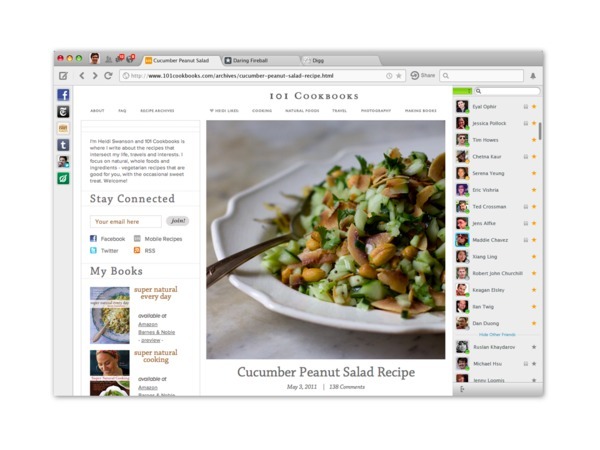
RockMelt announced Tuesday that it has entered a partnership with Facebook to create a deeply integrated social browser.
While there’s no capital being exchanged and though Facebook currently has no plans to promote the social browser, the two product teams are working together to fine-tune Facebook’s integration in RockMelt.
Right when you launch the latest release of RockMelt, you’re met with a Facebook Login screen. Once you verify with Facebook, the browser loads up and you immediately understand what “social browser” means.
On the left is App Edge, where a little Facebook icon gets updated with a sticker when friends and pages post updates. You can later add more apps like YouTube, Twitter and CNN to stay up to date with your favorite sites. On the top is a share link, so you can quickly send whatever page you’re on to all your Facebook friends or Twitter followers. And on the right are all your friends currently online available for chat.
(For the geeks: RockMelt is built on Chromium, the open source version of Chrome, so it looks and feels a lot like Google’s browser. In fact, it wouldn’t be entirely inaccurate to call the browser nothing more than Google Chrome with a bunch of social plugins pre-installed.)
“RockMelt was founded to re-imagine the browser for the way people use the Web today. Facebook shares our vision for a modern browser and we could not be more excited to collaborate with them to further the browser revolution. The new version of RockMelt we’re releasing today is just the start,” said Eric Vishria, RockMelt’s co-founder and CEO. “There is no doubt that social is the future of the Web, with Facebook at its core. It only makes sense that social should join navigation and search as fundamental capabilities of the browser.”
Founded in November 2008 by Eric Vishria and Tim Howes, RockMelt didn’t launch in private beta until exactly two years later. Since then, it’s been moving much faster, getting an open beta release in March of this year and an iPhone launch in April.
RockMelt won’t be scaring the most popular browsers anytime soon. Microsoft Internet Explorer, Mozilla Firefox, Google Chrome, Apple Safari and Opera combined account for well over 90 percent of browser market share–and that’s not taking mobile into account. In contrast, RockMelt only claims a million downloads and a few hundred thousand active users.
But then, social browsing is kind of a new idea. With Facebook on its side, RockMelt may do better than ever.















